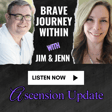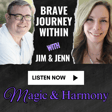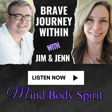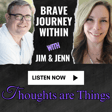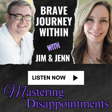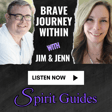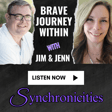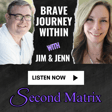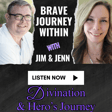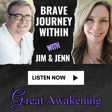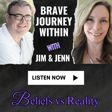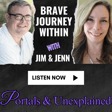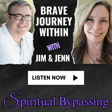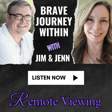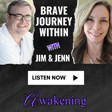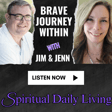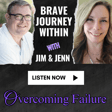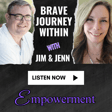Introduction to Self-Love
00:00:00
Speaker
Welcome to the Brave Journey Within with Jim and Jen. This show is about the spiritual journey and all of the challenges, healing, wisdom, and consciousness expansion experienced along the way. And we're back for another edition of the Brave Journey Within with Jim and Jen. And in this week's episode, we're going to be discussing self-love so that theme has come up. I shared a little bit about stuff last week, I think. Um, but we're going to dive into it. And this is a, golly, what's up? What's up? But Jen. Thanks. you Yeah, you too. You
Reflecting on Inspirations for Self-Love
00:00:52
Speaker
too. You had shared a video, a mat con video with me around the idea of
00:00:59
Speaker
your value and your worth. And it was very inspirational. I have not listened to Matt Kahn in a long time, and it was a nice reintroduction back into his work. And it just really got me thinking a lot about self-love and how do we cultivate that and and really build upon where we are now. And to get to a point where we're just so deeply loving of ourself in a positive way, um that we can be that power and that strength that we need to be in this world. Yeah. Yeah, you know, it's always interesting when you come across something that strikes a chord with you. ah You had said you were familiar with Metcon. I've never heard of him. You know, it's part of this. I don't know if
00:01:50
Speaker
awakening process, but just self-discovery where, you you know, certain messages from certain places hit you at certain times. They tend to be the right times. So I'm glad that it resonated and happy to share a little bit about that ah process.
Handling Criticism and Triggers
00:02:12
Speaker
Yeah, you know, I really I've come so far with the concept of self-love and just appreciating who I am and loving myself, even through my mistakes and my difficulties and failures or whatever it is you want to call these things that are less than perfect. And I've come a long way, but I am so, I'm not at the mat con level. You know what I mean? As I was listening to him talk, I'm like, I've still got a little bit of work to do there. I'm not so strong in my own self-love that nothing bothers me.
00:02:44
Speaker
Yeah. Yeah, because one of the things that he was saying is like, you know, when someone comes up to you, and they're hating on you, and they're they're just being really critical or or just really awful. If you really deeply and truly love yourself, you're just gonna be like, Oh, yeah, okay. I love you. You're being so cute right now. It's all good. Keep going, you know? Yeah. I think I I've gotten a lot better with that, but I am not at I'm not at stage of mat con level. Yeah. Yeah, no, it's something that stuck with me is don't let miserable people make you miserable. Right. It's so easy to say that it's so hard to practice that. Yeah. i think the Last few years I saw another Facebook meme saying something like I think
00:03:41
Speaker
I can't remember exactly what it said, but it was something along the lines of, I've lived four lifetimes of lessons since 2019. And I was like, that's that's pretty true. And some of it is just all the anger and hatred that people fling at each other. And you realize how much wounding is behind that. And how their triggers are not even really about you, and your triggers are not about them. And how do you separate that and do it in a way where you really are coming into a really healthy self loving relationship, you know, clearing out the things that are toxic in your life and
00:04:22
Speaker
not working for you anymore or that are keeping you from becoming what you're meant to become. Like that's an act of self-love. And just I think a lot of us have had really important lessons around that since 2020. Sure. Absolutely. um
00:04:42
Speaker
ah There's been a lot of change, right? I mean, how many death have we died in the paradigms and, uh, you know, I saw the world one way and then opened my eyes and saw it in the whole new way. It just blew my mind. Right. And now you have more discussions of, you know, the universe and consciousness and what that all means. Um, who was someone was talking about the concept of God.
00:05:18
Speaker
And, uh, they call, you know, the old model, like your sky daddy, you' like, like God's this guy in the sky. Right. You know, worship me and this and that. And it's like, whoa, that's so different. Yeah. So different. But yeah, it was, uh, one of my clients brought up, uh, the passing of Bill Walton, the basketball player. Hmm. I didn't hear. from familiar No. He was sort of a larger than life character. He passed away last week. And one of the things, he's a, I don't know if he was in the Hall of Fame, but probably, ah he was a huge deadhead. And it was just kind of like a very happy, large personality. And I was listening to a story about someone that worked with him decades ago. And he was so nervous about kind of like,
00:06:18
Speaker
pissing off Bill on the legend and Bill kind of picked up on his tension and said, Hey man, like you can ask me anything. There's nothing that you're going to say that it's me off. Like I won't let you, like I'm good. Like I, there's, I am okay. Don't be nervous. And he said this great gift, they got to know each other and hit it off. But setting the stage to getting to a point where he was content with himself and comfortable enough in his own skin that he was genuinely okay. So I thought that was something that was interesting to share just as far as we talk about, you know, states to be in to personally as you approach people that may not always be agreeable.
Authenticity vs. External Perceptions
00:07:15
Speaker
Yeah. Well, as you're talking about this, it it's reminding of some of the things I've been processing and thinking about since I listened to that podcast or that episode with Matt Kahn. Yeah. And one of the things that I think I still do a little bit is I see myself through others' eyes. And I think most of us do that a lot of times. And I've come a long way with it. I'm not doing it to the same degree I used to. But when you do that, you're setting yourself up for failure because you're trying to see yourself through all these different people's eyes and they're all going to have different points of view about you. And it doesn't even matter. Ultimately, it doesn't matter. And then if you're seeing yourself through other people's eyes, you're seeing yourself through their distortion and their wounding.
00:08:06
Speaker
And so a lot of us see ourselves through our parents' eyes or maybe our siblings' eyes and things like that. And we start trying to see, well, what would they think about me? Or if you're getting ready to post something on Facebook and you're like, hmm, okay, if I post this, what would so-and-so think about this? And what would so-and-so think about this? And how would this look to so-and-so instead of just being your true authentic self posting something that feels good to you to post? And you know especially nowadays, It's just like anything you post, you're gonna piss somebody off. And so I've just been really processing this idea of where do I still have that filter of trying to see myself through others' eyes instead of being the experience of Jen Palmer that I'm meant to be and just being really deeply authentic to me and what feels right to me in whatever moment um with integrity and love.
00:09:02
Speaker
why do I need to go through the filter of how other people would process that? And I think that's my next mat con level of self-love is trying to resolve whatever that is in me that's still trying to do that. And
Empaths, Self-Worth, and Healing
00:09:19
Speaker
I think that's going to get me to the next, the next level, you know, of just I love, I am therefore I am and therefore I love and therefore I am, you know, it's like, just that. And um so, I don't know, what have have what have you been processing since you listened to that? Well, it hit me pretty hard. So it's looking at, he gets into, in this lecture,
00:09:53
Speaker
self worth. So one of the things that he shares and he has, you know, this, this class repeat is this affirmation. I am filled with unlimited value. I am amazing. And because of that, I deserve to take the utmost care of myself. And he goes into it a little bit further in that with empaths, and you can go into your healing journey, your hero's journey, your family of origin, and all of the trauma that you may have collected in that period of time.
00:10:38
Speaker
Um, part of your process is healing that so that you can heal others, but as an empath or someone who learns to adapt, perhaps in unhealthy ways, you devalue yourself. So like in a family of addiction in which he talks about, and I can relate to, uh, you know, you're concerned with other people's feelings and emotions, but you're not paying attention to your own emotions. So what is love? You know you don't have, you you're not cultivating a healthy concept of that because you're tuned in to everyone else for safety, right? Survival. There's a reason why. Yeah. And I would even say, you know, when I look at how other people might perceive me,
00:11:32
Speaker
the The places where I still do that, it's still about survival. That's still what it's about. Because if they don't approve, then maybe I lose my reputation or i there's something to be lost there. And so that led me down a little bit further of like, well, what do I care if something's lost?
Boundaries and Self-Respect
00:11:55
Speaker
You know, so it's that deeper aspect of just truly accepting who I am. And like, it's all good.
00:12:02
Speaker
even if someone one doesn't see it that way. Well, so Jim, I'm curious, what when you if you're trying to describe what self-love is to somebody, what does self-love mean to you? And what what are the characteristics of somebody who has really good self-love and self-respect? Which I think go hand in hand. Some of that has really good self-love. Yeah, we'll get into the bad side too, but I just want to hear what your thoughts are about good. ah Well, I'm told no.
00:12:38
Speaker
It's a progress, right? Well, I'm a work in progress. we yeah yeah I think I've seen people who are genuinely loving, they need give and receive freely. They're humble. ah
00:13:02
Speaker
they're able to build up other people in a constructive way ah and not throwing their shit on anyone else, you know?
00:13:16
Speaker
um I think that's kind of where I would go with that. What about you? Yeah, I think for me, someone who really has good self-love they stand in their power because they believe in themselves so much. you Nobody's going to believe in you more than you believe in yourself. And so they just really deeply honor and respect who they are. um But which also means I think at times being able to, and some people call it boundaries,
00:13:50
Speaker
You know, that's one of those things where it's like boundaries to me can be a form of resistance. So that's something that's one of those lessons I've had to learn over the last few years is the idea of what are healthy boundaries versus unhealthy boundaries. And is it, am I creating resistance to something or am I standing my power about something? And so I keep trying to find ways where I should stand in my power around things instead of being in resistance to things or people or situations. And, um, I think self-love goes very hand in hand with the idea of being able to advocate for yourself and taking taking stands where you need to take them and in positive ways and in loving ways, but also not being a doormat. I think when people are doormats and they're very loving people, they're not being loving to self. Well, yeah, that's a really important distinction because a lot of people
00:14:49
Speaker
get into that habit of becoming a doormat. And that's not self-love. And I think a lot of people who are like us on the positive path of ascension, like you know when we talk about law of one, ideas of ascension, and that that model of understanding, we do. We're kind of like on a pendulum. you know Some people are really doormats, and they're very loving to others. but they they always put others above themselves because to them that's what being loving means. um And then there's the opposite where it's like, I love myself so much like screw you, you know, and I feel like, like any pendulum, I think we're meant to get off of the pendulum and I i
00:15:35
Speaker
think of the last few years part of my journey has been really trying to understand what does that look like and what does that mean exactly you know because if we're going back and forth between trying to figure out if we're a doormat or not you know a lot of times there's anger there and that's that whole victimization experience we're angry because we felt victimized in some way because someone crossed our boundaries or did something that was not loving to us. And, but because we're good people, we're going to put up with it, or sweep it under the rug or say it's okay and try to forgive but then something keeps happening. And the lessons aren't learned and the toxicity is still there so
00:16:16
Speaker
It's just this idea of, okay, I love myself enough to choose what's good for me. And whatever that is, I'm going to do it in a positive loving way because I don't want to create more drama or trauma to anyone around me. But yet somehow I need to, I need to be there for myself. So I think a lot of us in this community, we're always trying to be there for others, that we we don't know how to be there for ourself. And we don't know how to do that in a way that's congruent with really being a loving and full of integrity kind of and a kind of person. So I don't know, that's that's kind of where all of this sends me. It's like, how do we do that? How do we really cultivate that inner self-love, but yet still respect and honor others
00:17:04
Speaker
on their journeys and not take it personally and keep turning everything that's happening in our lives and whatever people are saying or doing to or around us, how do we use that within ourselves instead of lashing back out or doing something or lashing inwards, you know, just like what's wrong with me, you know, where we can really understand, OK, none of us are perfect. We're all going to make mistakes. I'm gonna love myself anyway. And you know, I'm gonna love that mistake because I just learned so much about myself with that. Oh, I see another area where I have more healing to do. And really approaching it from that state of openness and non judgment towards self. Yeah. So maybe it would be helpful to kind of walk a little bit through some of the things that I've worked on in my life.
Family Origins and Self-Worth
00:17:55
Speaker
years of therapy and questioning and learning new things and applying them to myself. Um, so one of the things, so family of origin, you know, we come in, we choose this environment that basically it's like a raw shock, you know, but yeah are whatever. Um, ah And then we we have these sort of wounds to heal, whatever they are. ah so And if it's not your family of origin, it might be you know the the place where you grew up or the neighborhood. or you like There might be external factors. Because I've had people say their families were great and they didn't have any real trauma to deal with from their family. But they had other things outside of like teachers and things like that. but Sure.
00:18:46
Speaker
Although that's always a red flag to me. Yeah. but Really? You had no family trauma? Oh. OK, sure you did. Nothing, huh? Gotcha. OK. okay oh Which is fine too, right? We're all on our own path. So maybe you did. a And there was other stuff. um But so. These things can go through generations. So, you know, um, I can look back and see how, uh, like my grandfather who was very hard on people to be perfect and succeed, push that on everybody else. But it came from this, uh,
00:19:38
Speaker
The trauma was that he felt, I would say, worthless in a way. like He wasn't didn't achieve what he wanted to do. So it came out as abusive. So he's passing transferring this wound onto the next generation. And everyone that's around it handles it in their own way. Some people chose to work on it, and some people didn't.
00:20:07
Speaker
Some of the people that didn't work on it were around me. So that got transferred to me. And you don't know this, right? You're just surviving as a young child. And so for those that don't know, you know, from the time you are are essentially a fetus, and whenever your consciousness comes into physical form, which can be at various points, but you're being programmed by the environment that you're in, and most notably your father's womb. So you're picking up all that energy, all that stress, of potentially fear, depending on the situation. And so that gets transferred to you. Now,
00:20:56
Speaker
As I started to work on myself in working with addiction, of course there's loving moments, but when you have a self devaluation conflict or you don't feel worthy, that
00:21:12
Speaker
That becomes very problematic, right? So one way that you kind of make yourself feel better is to, you know, drink or use some substance, right? So you kind of dull yourself for your emotions or you feel good about feeling less than. ah Some of these things might sound counterintuitive, but ah for a lot of the inner childhood work that I did, It was, I mentioned that I did Vipassana meditation, which is really the root of any time you hear the word mindfulness.
Vipassana Meditation and Self-Love
00:21:49
Speaker
It's really Vipassana, although not as deep and intense.
00:21:58
Speaker
So we keep stressing the body. So when I did Vipassana, I realized, okay, I have this anger which manifested as a pain in my body. And really what was underneath that was self-hatred or I mentioned like the five ah hindrances in Buddhist psychology or mindfulness, ah ill will, you might hear it, it might be ill will, you know, five of them, but that was one. And that could be anger and resentment towards others. I'm sure we all know someone that come across it like, man, that person just kind of hates everybody. Or yeah you might see like a lot of anger.
00:22:44
Speaker
you right ah You'll see these things manifest like cancer or issues with alcohol and stuff like that, ah which I also have so that it was like, okay, I have this conflict of not loving it myself because I'm not where I think I should be in life, in relationship. So, and a lot of that came from outside of myself, but then now it's my stuff. So for me in a lot of the work was to understand that I am loved. The problem with that is what the hell is love?
00:23:33
Speaker
Ah, yeah, true. I remember one of my theory was having me listen to the Forner song. Like, I want to know what love is. Like, I would just play that. We're just like, just marinating that. Like, sit with it. Like, you really do have to contemplate, you know, which is interesting when you ask, like, what's that question? It's like, I don't know. But for a theme in my life, it's always been you help others. yeah you know You become very good at it helping others because you learn to tune in to other people.
00:24:13
Speaker
not so great about tuning into yourself and feeling what you're feeling yeah or even that you have emotions, right? Cause emotions are scary and they're not safe. So figuring out what love is, has been a huge thing for me. And probably why that back home thing stood out to me was like, if I really do love myself, then I have to Really embodied this idea that I have a limited that right and if I really love myself Everything that I do
00:24:52
Speaker
I need to pay attention to and like, what is the loving thing to do? ah How do I act with certain people? How do I, I don't know. How do I receive when someone is lying to me? Like how do I yeah relate to that in the loving way? Like I'm not trying to like beat somebody up, right? but it's like I can see where they're coming from, like it's a fear-based behavior um or an anxiety-based behavior. So you start to see the evaluation conflicts in other people, but it's all on that process that is unfolding as we deal.
00:25:40
Speaker
So that's a little bit of how that affected you, where it's like, okay, you start peeling the other back a little bit more. it's You know, how can I be a little bit more kind, a little bit more like, to am I in alignment with that? You know, where am I in alignment or where am I not? Which is, you know, part of learning is being curious. When I think what we're meant to figure out and navigate and work through is this idea of, you know, self-love and doing what we need to do for ourselves.
00:26:17
Speaker
and not feel selfish about it. And having others say that we're being selfish because we're, we're doing something that's an act of self-love and trying to figure out, okay, like, for example, let's, let's look at something like, like divorce, you know, cause you've talked about that and lots of people been in relationships where we've had to say goodbye to somebody, whether we're married or not.
Balancing Self-Love and Expectations
00:26:43
Speaker
You know, and I'm sure we've all been called selfish for that. You're selfish to want to leave a relationship. You're selfish to, I don't know, want to move the whole family because you get a job down, you know, five states away or whatever. and
00:27:02
Speaker
when you know sometimes the act of self-love or what you need to do for yourself contrasts with what others are expecting in their need to receive love from you. It doesn't always match. oh I think that is where it gets sticky. you know Then then you've v you've got a choice. You've either got to not honor what you need to do for you so that you can give what someone else needs to get from you. or you need to choose you and what your needs are at the detriment of somebody else. And I think sometimes there might be some sort of a compromise, but a lot of times there isn't.
00:27:42
Speaker
You know, it's a choice. Am I going to do what I know I need to do in this moment for my best and highest good or am or am I going to do what they need and um or what they think they need? Sometimes it's not really what they need, but it's what they think they need. Right. And that's sticky. So if someone's in those situations, Jim, what would you recommend?
00:28:04
Speaker
This is the example that's coming up. It's a little bit extreme, but it happens. Um, you know, someone is, uh, I got a family members on life support, you know, and their desire is, listen, if that's me, you pull the plug and you don't think twice. That's what I want. And then when they are in that situation, maybe there's family members, siblings, things. They're like, no, somebody might be like, king you you gotta keep them alive on this machine forever. It's like, okay, in their mind, like, is that the loving thing or is that the fear of death or what we perceive death to be? had a And what is in alignment with love? you know And I would say, well, the loving thing is you honor that person's wishes
00:29:02
Speaker
And you you pull the plug and you do it in a very loving and respectful way. a But not everyone is in that, you know, mental state. So you'll start to see things come out like that. But the question is always, what does love ask of me? That's what I ask myself. Oh, that's beautiful. But a lot of times the loving thing is like the uncomfortable thing that you don't want to do, the conversation you don't want to have, the things you don't want to ignore about yourself. You know, I think he, what does Matt Kahn say? So something to the effect, like, you know, what happens when you close the blinds? Like what's, what's the thing that happens that you don't want anyone to know about, you know, acknowledging that shadow side and it's okay to have that shadow side, but just like,
00:30:03
Speaker
You know, admitting to yourself like, okay, I'm not, I'm not perfect, which is another thing too, right? People and healers too. You think you can't have anything or anything or have this good life until you hear yourself. And it's like, we're all a work in progress. Like we, you might conquer things along the way and then kind of reach, you know, different levels of elevation, but, but you're not here to be perfect. Yeah, which, you know, that's hard, especially when you're in any type of spiritual community, because and not just, you know, what we do, but I would think in any type of spiritual community, because when you get into spirituality of or religion or or whatever that is for you,
00:30:49
Speaker
you're doing it because you want to become a better human for some reason, or a better soul for some reason. So you're doing it to be better. And so you look to the leaders in those communities to help you understand how to be better. And then but they're human too. You know, it's like, in the law of one, it's teach, learn, learn, teach, right? You know, so none of us are perfect. But there's so much judgment thrust upon spiritual leaders, And I'm not saying, you know, that everybody deserves like a free pass, you know, if you look at what's going on, like in some certain church leaders, yeah how they really harm children. Sure. Right. I mean, that's not to be given a free pass, but at the same time, it's no one's job to judge them. You know, that is their spiritual journey. And for whatever reason, they're on that journey, learning some really hard lessons. And
00:31:45
Speaker
How do we forgive that? How do we forgive our leaders whether they're doing something terrible in that way or but they're just, they're suddenly faced with their own evolution and and going through another initiation or some sort of really strong test or strong lesson that to the people around them looks like, oh, their life isn't as great as I thought it was. I actually had someone tell me one time when I first got into the spiritual community and um She was a friend of mine and she said some some really interesting things and I was like, wow, I don't know if I ever want to be a spiritual leader. But she was just like, every time I find a spiritual person that I think is good to follow, they got great ideas or they're good healers or something, I realize how messed up their lives are. And I realize I don't want that. And I just remember thinking, well, your life isn't all that great either. Yeah, you know, and we're not meant to be leaders because we're perfect. We're meant to be leaders because we've navigated some things and we have we're further ahead in that path than other people. And there's always going to be someone ahead of you. And there's always going to be someone behind you. And the people that are behind you, we're all meant to lead each other through that path. And the people
00:33:05
Speaker
yeah wherever we are, we're meant to look to people who are ahead of us to navigate certain things. But at some point, we may surpass them, or we have different challenges in them, or they're going to hit something that they're going to be taken out of the picture for a bit because they've got some processing or healing to do. We only judge it because we don't have enough love for ourselves. And we're seeing in them something that's probably within us. And um so I think self-love goes also hand in hand with judgment of others and that that comparison and and looking at what other people are going through and processing your own self-worth through that lens of our judgments of other people. And we all judge, we all have those judgments. So how do we acknowledge our judgments, shift it and realize that's within us?
Judgment, Self-Worth, and Criticism
00:33:58
Speaker
would you do that, Jim? And like what if you're open to talking about it, what are some things that you looked at that you've noticed that you judge and realize it's more about you? I mean, just recently, you know but across the podcast, and I'm like, oh who the hell is this guy? Like I'm better than that guy. Or just like, what are your credentials or what kind of work have you actually done, right? um It's usually skews negative. A practice in mindfulness is just mentally noting.
00:34:39
Speaker
What the process is that I, is happening in my brain. Like, Oh, I'm judging this person. It's probably going to be negative, but that's a trigger. If there's some kind of so devaluation thing going on with me, right? Like a ah lack of self-esteem or confidence or something like that. So then it's okay. How do I work with that? Well, let's see, like, what's the good in this? You know, like your attention came here. What, you know, what's the value of this and how can I learn from it? So like, be curious about it. You know, what can I get out of that situation that's constructive, which I think is important, right? Like we're not trying to like tear anyone down or beat yourself up.
00:35:31
Speaker
Right. It's being curious and learning like what's within me that got me so upset or triggered me in in some way. You know, I'm not running for a safe space or anything like that and not trying to avoid. Which I think a lot of people, they don't even think of about it. You just, they're constantly judging everyone else, which is, you know, the defense mechanism, but like you're constantly blaming and I don't think people realize how often they are in the victim state mindset. Yeah. Which is easy to do still. Like I can still catch myself going into that mode and I'm like, man, all right, that happened.
00:36:17
Speaker
When I think with what Matt Kahn was saying, too, you know, like when people are coming at you and criticizing and, you know, it's just like he meets it with like, Oh, look at you, you know, i think he does not take any of it personally. And I think that's so refreshing. Oh, yes. And that we we are we don't have to be held to the standards of others because their standards are not ours. and what you know Whether they're higher standards or lower standards, its like it doesn't even matter. It's not even a thing we should be asking. it's and i Basically, am I living the life and doing the things that when I'm on my deathbed or I've just passed and I'm having my life review, will I be proud of this?
00:37:03
Speaker
Is this something that I came here to do? Is this a lesson I came here to learn? Did I help others learn that lesson? you know And did i did I do things out of selfishness or did I do it out of self-love? Because it's very different things. and um yeah so Yeah, I mean, I think if if we just live according to those principles, None of it, ah um nothing else really matters. And people are going to get hurt along the way because they have different expectations of you. But that holds us back. That's their stuff. Yeah. Yeah, very much. I loved how
00:37:45
Speaker
Oh, how did he say it? You know, someone's like, I don't know you. I've never met you, but I just want to tell you, I don't like you. It's like, Oh, okay. Well, you healing energy. Yeah. Yeah. they are yeah she well Yeah. He likes their comment. He doesn't like. deleted or anything. He just likes her comment. And to him, that's like, Oh, I'm giving you healing. You know, that's just lovely. Yeah. Sure. Yeah. And he has some other kind of very articulate words about it, but essentially like, how do you meet this person with love? Right. I love myself enough that I'm not going to let that bother me. Yeah. That's incredibly powerful. Right. You can't trigger me. I won't let you.
00:38:39
Speaker
Right. I have the power. You can say whatever you want. But people don't see it that way, right? Well, I think it's because we tend to look at ourselves.
Compassion and Self-Perception
00:38:51
Speaker
So if someone's criticizing us. We tend to, for a moment, look at us through their eyes. And maybe it's because we're trying to be empathic. We're trying to be you know compassionate. and how you Because we were always taught, well, put yourself in the other person's shoes. I don't know that that's always a healthy thing to do. Because it makes you start questioning where you're coming from. And then you start seeing through their wounded lenses instead of just being who you are.
00:39:23
Speaker
doing the best you can with all the love that you have and all the integrity that you have, we're bound to make mistakes. um That's like, you know, have you ever had an experience where you say something and you maybe you post it or you say it to somebody and you mean it really good from your heart and you're not meaning any harm by it. And you think it's a really great thing to do or say, and then they take it the complete wrong way and they get mad at you. You know, it's like,
00:39:51
Speaker
Did I do something wrong? No, no, I didn't do anything wrong. The way they perceived it is it's a distortion and it's their distortion and I don't have to own that. So being, yeah that kind of goes hand in hand with the idea of being compassionate. A lot of people think being compassionate means that you have to always see things from other people's perspectives. And I think that's why this is so hard to navigate sometimes because we do want to try to understand how somebody is seeing the world because maybe we can help them in a better way. But we also need to know when that's not a healthy way to approach something too. And so I think a lot of all of this is just being able to discern
00:40:36
Speaker
As you're walking through this path, what is healthy and what's not?
00:40:43
Speaker
Yeah. I mean, none of this is easy, right? Like when you are actually doing for meaningful work in your life, ah you know, one of the reasons that this a discussion was intriguing to me is that for all the work I've ever done, but this is a work in progress.
Self-Work and Relationship Dynamics
00:41:04
Speaker
You know, I'm a professional counselor. And if you're seeing a counselor, they should be working on themselves, by the way. Or anyway, really. ah But as you do that, why do I act a certain way? Or, you know, where am I showing up in relationships? Where am I hiding? Where am I not talking about something?
00:41:29
Speaker
ah Where am I self-sabotaging? ah yeah And would you you know when you put things under the microscope, there's some things that are not pleasant, but they're all worthwhile. Because if you're really healing, you know what? Maybe I do want this relationship to work out. And I have been self-sabotaging. I'm working out my yeah my own trauma. in the context of the relationship where they tend to be mirrors, right? So like where you see most of your growth is in a relationship typically. And then it's tough, right? Like it's not pleasant. Yeah. But
00:42:17
Speaker
It can be terribly wonderful because if you you know are willing to bring wonderful yeah if you're willing to work on it though, I think you get to experience like bliss and joy. like I do believe that. like Why would you want to work on anything if you didn't get to experience something good or to believe that you deserve good things in your life? Yeah, very true. And experience love. But part of that is giving and receiving. Which he also talks about. I don't know if you caught that. ah He was saying, ah as he was becoming more successful, Matt Kahn, who is a spiritual teacher, I guess. I don't know how else to describe him.
00:43:00
Speaker
ah like When he would get complimented, like, hey, Matt, that was fantastic. And he'd be like, oh, yeah, that's great. We're all welcome. and Right? Yeah, I did catch that. I'm not receiving the compliment. Yeah. But he wasn't, in in not accepting it, he was doing a disservice, right? Because part of being able to give out this positive energy is to receive it. And then we all benefit from it when he gives it back out. So I thought that was interesting. Yeah, I did too. Yeah.
00:43:38
Speaker
Because in a way it's like you're denying yourself. Yeah. So if you really love yourself, you're not going to deny yourself. You say you received it. You say, thank you I really appreciate that. It means a lot. Yeah. Yeah. Yeah. I can't wait to do it again. I remember hearing that and I was like, Oh, that's a great point. Yeah. Cause I think there are areas where I do that too. Sometimes I kind of gloss over the compliment. and quickly move on. And I'm like, why do I do that? I think we just don't want to be egoic and we don't want it to be about the ego.
00:44:19
Speaker
But we all have ego. It just needs to be a healthy ego. And how do you operate from your soul and still have ego but a healthy ego? But I think most people tend to operate from ego and don't even pay attention to what their soul is about. So again, I think it's that navigation of just trying to figure out what does this actually look like in a healthy way? I think What I took away from that is as you expand and grow, you're able to hold greater energy. Great. Yeah. Great point. a And that's a beautiful thing. It's not something to hold back because we all benefit from that. You know, he was talking about, uh, overcoming depression.
00:45:07
Speaker
And how, you know, when you meet somebody, when you show up and you're present and you acknowledged their at humanity, maybe, you know, like, I really appreciate you. ah The good in them, like, it can light someone up on your Christmas tree, right? Like, people love, like, we it's when it's sincere and it's honest and it's authentic, People love that, you know, and it's going to make you feel good. So the more that you're able to give, you know, you set yourself up for bringing in more in your life, which I also thought was really helpful. Yeah, so true. Trying to think of what else but was in there that we wanted to coverage in.
00:46:01
Speaker
Yeah, I think that was most, most of what it was.
00:46:07
Speaker
And I'm just saying, yeah as are different people are flashing into my mind that I just i really hope they watch this because the i did they they so much need to love themselves and they have so much shame or guilt or they've got certain addictive behaviors or they just need other people constantly to to tell them how good they are instead of knowing how good they are. And so they need that reflection from others to try to feel worthy enough. And I just hope that everybody listening to this realizes that you don't truly need that and that your journey really truly is a journey of self-love. And I think a lot of this the spiritual teachings and and everything we're going through and the healing and the clearing and all of this, it's really about loving ourselves enough
00:47:06
Speaker
to do the right things and and to step down our paths the way we're really truly meant to with our own self-awareness and self-worth, self-respect, all the selves, you know, really just stepping forward in your life and in your experience, knowing that that is what is really truly best for you and yeah been brave enough to do that. Oh, Brady, that's a tricky word. Yeah. Well, you attract things if you're not careful, right? If you don't yield.
00:47:45
Speaker
Well, true. And then as you're moving out of it, those things don't want you, those things, people, whatever it is, those situations, they don't want you to leave. So they're going to try to destroy you by making you feel bad or making you feel guilty or selfish for trying to do what you feel is really truly best for you. And I'm thinking of like narcissists and love bombing. Yeah, but or even really codependent relationships. you know When you start pulling away from a codependent relationship, it's codependent because there's no self-love. So as one of those two people starts becoming more loving and an honoring of self, the other one gets upset.
00:48:27
Speaker
And they can respond in different ways, but usually it's to make you feel bad. And there might be different tasks tactics. They might get angry. They might make you feel guilty. They might start talking about you. know So they're going to make it difficult for you to live that codependent relationship and or to redefine what it's supposed to look like even. you know I've been through a lot of that where you're just trying to redefine and and create a different definition for that relationship or that connection. And it, um you know, it really does revolve though around healthy self-love. Yeah. Yeah. He talks about co-dependency says, you know, when we heal the root of co-dependency, that's where you start to create space for different people to come into your life.
Codependency and Self-Love Journey
00:49:13
Speaker
People that will communicate their needs in presumptively a more healthy way. Yeah.
00:49:22
Speaker
Um, yeah, he goes on, and he said some really good stuff. Um, we do attract things, but it's not the way people think we attract things to ultimately bring to our awareness, the games that we play on a subconscious level, which was what I'm talking about. It's like this transfer of trauma or, uh, lack of worthiness when we're young, um, that I was describing earlier. Um, that I attract someone into my life that gives me infrequent attention so that I can keep wandering, sorry, wondering where I stand. Right. So like sometimes we get in that space with people where it's like, where am I really? Do they value me? Do they not value me? You know, do I see my value through how much they value me or that I perceive that to be. Right. And then when you're not in relationship, you wonder where you stand in the universe.
00:50:19
Speaker
You know, am I aligned with the universe? Does the universe like me? Obviously, it doesn't dislike you. Am I pleasing the universe? And we're still playing it out in our spiritual path. It's all here to wake us up out of our ego games. And as you wake up from your ego games, it's more of a journey of being one with the spirit than about fixing yourself. Yeah.
00:50:49
Speaker
And I might add sort of remembering who we are.
00:50:59
Speaker
It's so funny. So the visual I'm getting, it's almost like that there's, I think a lot of times when we go down that healing journey, we we do feel so broken. But to me, it's about You know, I think we're really not broken. We don't need to fix ourselves. We just need to reattune and to clear out the distortion so that we can become more one with the all that is and feel more aligned to that. um Yeah, that's fascinating. Assuming is a great word, right? And we collectively, the more that we attune ourselves to each other,
00:51:41
Speaker
consciously, we'll start to see more dramatic shifts and changes in a more positive direction. But it's got to be a positive attunement, too. We can't do it in a way where we're attuning at a lower level. We've got to, we've got to raise it. We've got to go with the context of our conversation, Jim. i know well ah positive We have a choice of where we want to put that tuning. and And you gotta be careful, right? You gotta be careful with things. um You know, keep in mind too, right? One way to kind of ah pay attention to things, where your attention goes, the energy flows. So you gotta be careful where you were putting your attention.
00:52:29
Speaker
You know, I don't know. I don't know if I really want to elaborate more on that, but you know, if you're doing things constructively, Uh, you know, you're not spiritual bypassing, you're not pie in the sky, toxically positive. You know, it's, it's realistic, but it's impractical and healthy.
00:52:53
Speaker
So did we answer the question, Jen? What is self-love? I think so. I mean, as best as I think anybody can, I think it's a journey.
Conclusion and Affirmations
00:53:07
Speaker
It is a journey, uh, which is why I call my place journey, mindfulness and but like called my waterings journey. What better word to use, right? Like you have life experience, like who knows where this is going to end up. Oh, and as soon as you feel like, you know, where that's ending up, then another experience starts unfolding. Oh yeah. It's a never ending journey.
00:53:36
Speaker
You know, through are all these things that we ever talk about, you got to be able to laugh and smile at some of these things. You know, um, be grateful for the challenges that you have if you can. Right. Like if you're able to do that and just see them as learning opportunities, like, you know, there's something to be gained from it. Yeah. So. So I think that's all I got. Yeah, me too. And I hope that this was helpful for some of you out there. I hope that you find value in yourself and that you can really explore you know what in your life can you be choosing differently to honor and love yourself more in a positive way.
00:54:22
Speaker
Sure. And I want to add, I'll just repeat some of the phrases that came up that resonated with me. I'm filled with unlimited value. There is nothing wrong with me because I am filled with unlimited value. And unlimited value because there's nothing wrong with me. and There's nothing wrong with me because I'm filled with unlimited value. Yeah. Start to program your mind in a healthy way. yeah ah You know, know that you are amazing. And because of that, you can take the utmost care of yourself. And if you could start to do that, if we all did that, you know, we'd be in a better place right now. So true.
00:55:08
Speaker
So I guess we'll end there. If you've made it this far, uh, it's lovely and you know, we'd absolutely love to hear from you. So if you have any comments, please, you know, like subscribe, share, um, you know, we'd love to have some ideas about things that you might like us to talk about as well. That would be helpful. Absolutely. And please know that we are grateful for you listening.
00:55:40
Speaker
All right. Until next time, Jen, be brave. Yeah, you too. All right. Bye. Bye. We are so grateful that you joined us. Check out the description to learn more about us and also for additional resources to help you on your journey.

